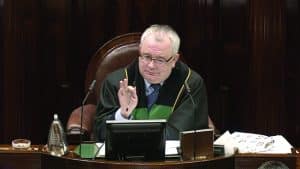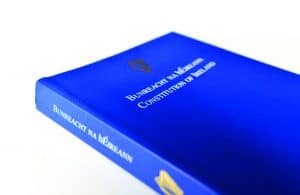Parliamentary privilege is a vital part of democracy, and a necessary part of the checks and balances which underpin the separation of powers between the legislative, executive and judicial branches of government. Any subversion of privilege risks undermining its purpose.
Privilege has many similarities with diplomatic immunity, which is recognised internationally. Diplomatic immunity ensures that foreign missions are not compromised by threats of prosecution, regardless as to whether the alleged offences are trumped-up or real; the idea is that a foreign state is not seen to be sufficiently independent in determining whether an offence is real or trumped-up.
To avoid any doubt, most offences are un-prosecutable without the consent of the home state of a diplomat, which can waive immunity. This immunity sometimes results in injustice, when abused. Such cases include the shooting dead of a UK police-woman outside the Libyan embassy in 1984, and the granting by South Africa of immunity to Grace Mugabe, wife of Zimbabwe’s dictatorial president, after she allegedly whipped a hotel employee with an electrical cord. However, the system of immunity is retained and respected internationally, to ensure more effective communication between states.
Democracy is as important to citizens as inter-governmental-discourse is between states.
Hence, any watering-down of privilege creates huge risks, particularly in Ireland against a background of the inadequacy of the protections for public-interest commentary enshrined in the 2009 Defamation Act.
The difference between one TD stating her opinion of criminal conduct, and a group of TDs stating an opinion of criminal conduct, after holding a committee investigation, appears to be that the latter is effectively adopting the stance of a Tribunal
Minimal safeguards
Even in the absence of penalties, there are some minimal safeguards in place already: first, the public is on notice that a controversial statement made in the Dáil, under privilege, is often made because the speaker may not, yet, have the relevant ‘proof’, and hence, the statement carries with it a certain level of uncertainty, as a result.
Second, TDs can be sanctioned by their constituents in any subsequent election if they are deemed to have ‘abused’ their privilege; this may seem to be an unrealistic mechanism, but it is a key foundation of serious democratic governance.
Third, affected parties can seek to have the Dáil record amended to reflect the Dáil’s disapproval of a defamatory statement or a statement in breach of privacy. It is important, in this regard, that the Dáil record is not redacted, but rather is just annotated to the effect that a particular statement was disapproved of by the Dáil, as redaction would undermine the ability of persons to cite the particular comment, armed with the proof that it is a privileged statement.
The Constitution
A review of the constitution suggests that no route exists for the imposition of financial penalties for abuse of privilege. Article 15.10 states:
“Each House shall make its own rules and standing orders, with power to attach penalties for their infringement, and shall have power to ensure freedom of debate, to protect its official documents and the private papers of its members, and to protect itself and its members against any person or persons interfering with, molesting or attempting to corrupt its members in the exercise of their duties”.
This provision envisages that TDs need to be protected in exercising their duties; one of those duties is to inform the public of matters of public concern, using privilege if necessary to do so. Any significant fines risk undermining TDs’ duty to the public. Privilege is to the advantage of the public, not of TDs, and is simply exercised by TDs on behalf of the wider public.
Article 15.13 of constitution states:
“The members of each House of the Oireachtas shall… not, in respect of any utterance in either House, be amenable to any court or any authority other than the House itself”.
Under this provision, a TD can be made amenable to the Dáil. This would appear to require support from a majority of TDs, in a vote. It appears that any authority, such as a Committee on Privileges, other than the relevant House, cannot impose any sanctions. Hence any recommendation of sanctions would need to be approved by the Dáil in a vote.
Financial sanctions cannot be imposed via a normal fine process, as this would require the engagement of the courts should an Oireachtas member refuse to pay such a fine. To circumvent this consideration is being given to docking members’ salaries instead.
The rules under Article 15.10 can be passed by either House (Dáil or Seanad), but do not extend beyond their respective Houses, and do not need the bi-cameral approval that most laws require.
On the other hand, all pay and expenses payable to TDs need the approval of both Houses as such payments must be sanctioned by statute law passed by both Houses of the Oireachtas. Article 15.15 states:
“The Oireachtas may make provision by law for the payment of allowances to the members of each House thereof in respect of their duties as public representatives and for the grant to them of free travelling… as the Oireachtas may determine”.
At first glance, there appears to be a potential conflict between sub-articles 15.10 and 15.15:
While, 15.10 suggests that the Dáil may be able to dock a TD’s pay, 15.15 suggests that any such interference has to be imposed by an Oireachtas (both Dáil and Seanad)-approved law, but would such a law be constitutional?
A literal interpretation
In 2010, a Seanad committee made an adverse finding against Senator Ivor Callely, relating to expenses, and imposed a one month salary suspension, using Section 28 of the 1995 Ethics in Public Office Act (as amended). Callely won a judicial review of the penalties in the High Court, in 2011, but this decision was reversed in a 4 to 3 decision of the Supreme Court in 2014.
It appears that the case primarily revolved around the issue of fair procedures. It is unclear whether the constitutionality of the 1995 Act was itself challenged, but it appears not. The 1995 Act sets a suspensions period-limit of one month, and a corresponding limit to the level of salary reduction, which can be imposed. It appears constitutionally questionable as to whether the Seanad can impose significant salary reductions, in the context of where the constitution calls for the regulation of such salaries by the Oireachtas. There is a principle of law, that one cannot delegate to another that which one is authorised only to do oneself (Delegatus non potest delegare).
The High Court found that the statutory regulation of salaries is reached “by Article 34(3) of the Constitution”, implying that Seanad imposed deductions are subject to judicial review. A majority of the Supreme Court (4 to 3) found that fair procedures were not breached by the Seanad, and thus reversed the High Court’s finding on this issue. However, a majority (also 4 to 3) agreed with the High Court that statutorily based sanctions were judicially reviewable.
This is significant. If the Seanad or the Dáil seeks to impose statutory based sanctions, then the Callely case suggests that such sanctions are judicially reviewable. However, if sanctions, such as statutorily based salary reductions are imposed for abuse of privilege, then it seems inevitable that the issue of privilege would be dragged before the courts; this appears irreconcilable with the requirement that privilege not be amenable to the courts.
It appears implicit in the constitution that sanctions for defamation within the house should not exceed those which can be imposed by each House itself within its own domain. Such sanctions could, at the most extreme, include expelling a member from the house for a short period, or might involve restricting their speaking time within the House to below a normal level. A failure to accede to such a restriction could then be construed as a breach of the peace which would allow the engagement of external authorities.
House rules alone cannot overrule an Oireachtas-mandated payment to a TD; at least a statute is required. If the Dáil alone sought to instruct a civil servant to dock a TD’s salary, then any such action would be ultra vires the power of a civil servant, as a House rule, or a subsequent direction (by the Speaker, for example), cannot overrule a statutory obligation to pay a salary. Hence, both a statutory or a rules approach to salary reductions appear unviable.
The Abbeylara conundrum
In Maguire v Ardagh (2002) (the Abbeylara case), the Supreme Court held that conducting an Oireachtas inquiry capable of leading to adverse findings of fact against a person so as to impugn his or her good name was not within the powers of the Houses of the Oireachtas. Members of the Houses were specifically excluded from the order sought by the applicants, in terms of persons against whom adverse findings could not be made. The case indicates that speech within the Oireachtas has limits.

It appears that should a TD state that she believes a person acted in a criminal manner, that a statement enjoys privilege. However, if a group of TDs form a committee and review evidence, engage in deliberations and issues findings alleging criminal conduct by persons (outside of the Oireachtas, at least), then such a process is illegal.
The difference between one TD making a statement of opinion of criminal conduct, and a group of TDs issuing an opinion of criminal conduct, after holding a committee investigation, appears to be that the latter is effectively adopting the stance of a Tribunal. This suggests that because a committee engages in detailed deliberation following the hearing of evidence, the weight of its opinion is greater than the spontaneously expressed opinion of one TD and is therefore potentially more damaging of the reputation of persons against whom adverse findings may be made.
This distinction may have implications for any Oireachtas committees which may investigate allegations of abuse of privilege (or the House itself). If such a committee issues an opinion that a TD has abused privilege, following a cursory review of available information, then such an undetailed assessment could be characterised as a group opinion formed for the purpose of expressing disapproval of a TD’s action, accompanied by a verbal reprimand. However, if the Committee engages in detailed examination of all available evidence, with cross-examination of witnesses etc., then the danger exists that should the committee make a ‘finding’ that a TD had not abused privilege, then such a finding might give the impression that the Committee had concluded that the TD’s contested statement might be true, thus exacerbating the alleged defamation.
Hence a conundrum could be created by empowering a Committee to impose sanctions other than a mere verbal reprimand: if a committee seeks to impose significant sanctions on TDs, such as significant fines, then the procedures used by the committee need to be more formal and to thus reflect those of an investigative Tribunal. However, if the procedures are made more robust, then the Committee risks adopting the status of a tribunal in the Abbeylara sense, and any findings of non-violation of privilege risks reflecting badly on the reputation of the person about whom the contested statement (under investigation) was made by a TD.
Additionally, if a person’s Abbeylara (constitutional) rights are infringed by the Oireachtas, then a person could sue the Dáil/Seanad (or a sub-committee) for compensation (Kennedy and Arnold v Attorney General [1987] IR 587).
Natural justice

The imposition of fines by a political body (the Dáil) would also interfere with TDs’ property rights, but the fairness of such a process could not be subject to judicial oversight, as this would mean that the issue of parliamentary privilege would have to be amenable to the courts, which the constitution outlaws. In the context of various judges’ comments about the potential bias of TDs as outlined in the Abbeylara case, it is difficult to see how natural justice could be scrupulously adhered to, by a financial-penalty-imposing Dáil tribunal.
The government, which appears to be still reeling from its kyboshed attempt to amend the constitution to overcome the Abbeylara restriction in 2011, may be loath to seek an amendment to weaken parliamentary privilege. Abbeylara hangs like a cloud in its restraint over potentially more dynamic Dáil committees, but it may have a silver lining.
